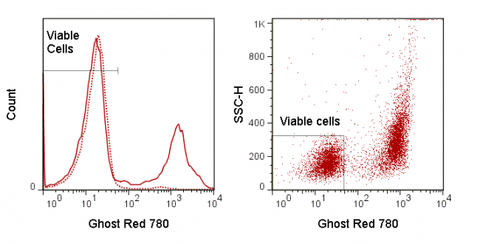
Ghost Dye® Red 780
カートを見る または ショッピングを続ける
説明
Ghost Dye® Red 780 is an amine reactive viability dye that can be used to discriminate viable from non-viable mammalian cells in flow cytometry applications. This dye irreversibly binds free amines available on the cell surface as well as intracellular free amines exposed in cells with compromised cell membranes. Necrotic cells with compromised membranes will react with significantly more Ghost Dye® Red 780 dye than viable cells in the same sample and therefore will exhibit much greater fluorescence intensity allowing exclusion of these cells from analysis.
PRODUCT DETAILS
Excitation Laser: Red (633-640 nm)
Emission: 780
Format: Ghost Dye® Red 780, Viability Dye
Isotype: Mouse IgG1, κ
Application: Flow Cytometry
Storage: -20°C protected from light and moisture
Formulation: 1 µL/test in DMSO
Protocol: Download Protocol
PREPARATION & STORAGE
Ghost Dye® Red 780 is provided in solution prepared in anhydrous DMSO and should be protected from light and moisture. Store vial at -20°C. Prior to use, allow vial to equilibrate to room temperature before opening. Ghost Dye® Red 780 dye is stable through 20 freeze/thaw cycles, if needed, aliquot smaller volumes and store at -20°C. Cells labeled with Ghost Dye® viability dyes can be cryopreserved for later use or used in intracellular staining protocols without any loss of fluorescence intensity.
APPLICATION NOTES
Ghost Dye® Red 780 has been quality-tested for flow cytometry using mouse thymocytes and can be used at 1 uL/mL of cell suspension. The concentration required for optimal performance should be determined empirically by investigator. Ghost Dye Red 780 is excited by the red (633 nm) laser line and has a peak emission of 780 nm that can be detected using a 780/60 band pass filter commonly used for detection of APC-Cy7.
For Research Use Only. Not intended for use in diagnostic procedures.


